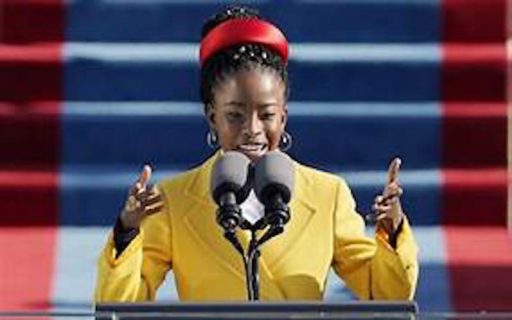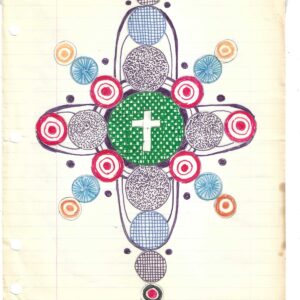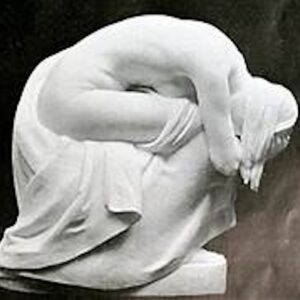If anyone embodies the hope and the contradiction of the Inaugural Pronoun “We,” that person— that whole person, not three-fifths of one— is Amanda Gorman, brilliantly performing her Inaugural Poem at the Presidential Inauguration of Joe Biden.
There she glowed, vibrantly alive in the yellow coat and red hat emphasizing the deep mahogany of her youthful skin, framing her balletic hands, her beaming face.
Just two weeks before, on the same steps on which she now stood, swarmed what Gorman refers to in her poem as “the force that would shatter our nation rather than share it.”
Note Gorman’s use of “force.” No persons or groups are named. Why not? Because Gorman is protecting the Inaugural Pronoun. She is keeping safe the “We” of the Declaration of Independence (“We hold these Truths to be self-evident…”) and the “We” of the Constitution (“We the People…”).
She is keeping these Inaugural “We’s” safe from dissolving into a rivalry, into a “we” versus a “them.” Gorman’s Inaugural “We” is the “We” without the “them”— the “We,” the unity, that includes literally everyone. No person excluded. No person left out. E pluribus unum.
Gorman’s boldness in avoiding the rivalrous “We” wasn’t a solo leap into the unknown. It honors the bold imaginative leap made first by Jefferson, who drafted the Declaration (ratified in 1776), and then by Gouverneur Morris, who drafted the Constitution (ratified in 1788). All three— Jefferson, Morris, and Gorman— dared to assert a truth that keeps slipping through our fingers.
It slips through because this truth is not usually confirmed, held stable, by social reality— which tends to be factional, rivalrous, tribal— a reality whose “We” is not all-inclusive but oppositional. ‘We” wear white hats, “they” wear black ones. “We” are obviously, eternally, righteously right, “they” are obviously, eternally, damnably wrong. “We” are the victims of diabolical injustice, “they” are agents of Satan, determined to exterminate us.
Acrimonious political rivalry isn’t new to our time. Jefferson and Morris knew plenty of it. Jefferson himself contributed mightily to it, in the disputes between Federalists and Democratic Republicans that broke out during Washington’s presidency.
Even in the founding documents themselves, the Inaugural Pronoun “We” has a hard time surviving the language that surrounds it.
James Boyd White, in When Words Lose Their Meanings, brilliantly shows, in his close reading of both the Declaration and the Constitution, how nearly their respective “We’s” come to foundering in the turbulence of everyday reality.
Yes, the Declaration famously asserts that “We hold these truths to be self evident, that all men are created equal….” This “We” makes this claim calmly, and how otherwise? If the truth is self-evident, no argument could be raised against it.
Furthermore, though plural in form, this “We” “appears to issue,” as White puts it, “from a single imaginary author, consisting of all the people of the United States, including the reader, merged into a single identity in this act of self-constitution.”
Yet, as White further demonstrates, the Declaration’s “We” is not only, or not for long, the singular voice of a multitude rising above all debate into a realm of imperturbable certainty. The calm, philosophical “We” quickly becomes the rousing “We” pronouncing what White calls “a battle cry” issuing from the collective mouth of the army assembled. It’s a cry that not only rallies its audience— its army— to unified resistance against the “them,” the common enemy; it also creates and embodies that army. This “We” of the Declaration continues its cry until its mission, the defeat of the enemy, has been secured. It is a “We” whose meaning and duration is dictated by the struggle it initiates, and when the struggle is won, “We” becomes silent. Silent because the “them” has been erased. Without a “them,” there is no oppositional “We.”
But then, out of that silence, the war having been won, the “We” reemerges— in the Constitution. It begins exactly as the Declaration’s “We” did, as the all-inclusive “We”: the calm bearer of a truth beyond dispute, and as the embodied single agent of a multitude. “We the People…do ordain and establish….”
This time, though, the “We,” this collective identity, is not raising a battle cry and creating the army to answer it. Yet it is calling its audience, that is, itself, to a similarly explosive mission: an endlessly aspirational rather than a limited military one. It is that of forming “a more perfect union,” one defined by its dedication to justice, tranquility, defense, welfare, and all the “Blessings of Liberty.” This “We” wants to form an even more perfect “We”!
I call such a goal “endlessly aspirational” because who can say when (or if) such a union would ever be achieved? How would “We” know it when “We” saw it? The Constitution’s very words for it— “a more perfect union”— place a powerful tension or contradiction at the heart of its project. (The word “perfect,” the English teacher in me eagerly points out, doesn’t admit of degrees. Something is either perfect or it’s not!) So while the goal looks firmly planted on paper (that “more perfect union”), it seems to recede the closer “We” get to it.
And what of the far deeper contradiction, that of a “perfect union” which, in the Constitution, excludes “people” like Amanda Gorman’s forebears? Or native Americans? Or women? Or…?
There’s also the more immediate contradiction, one emerging as soon as “We” consider what establishing a “more perfect” union entails. As White points out, no sooner does the Constitution speak in the voice of one nation, as and of “We,” than it “divides itself into parts: the separate states, the branches of the federal government, the individual persons who fill various offices, and the citizens….” Unlike the Declaration’s “We,” where the philosophical “We” becomes the warrior “We” against an enemy “them,” the Constitution’s “We” dissolves itself into a “them” which is constitutive of the original “We.”
Whew! The image I have from thinking about the Inaugural We is wildly fluid and elastic, at once infinitely expanding and contracting, like a heart, perhaps: gathering itself together, then releasing its energy outward.
But hearts don’t beat all by themselves. They beat in order to empower a body’s motion. Not a circular motion, but motion towards a goal, however that goal is defined. In the case of the heart which is the Inaugural We, the body politic it drives is not chasing its tail— forming a belligerent unity, let’s say, that struggles endlessly to annihilate a perpetually antagonistic “them.” No, from Jefferson onward this body’s drive is, as I’ve suggested, aspirational, towards that “more perfect union.”
But as Amanda Gorman reminds us, the drive is also transformative, so that
…a skinny Black girl descended from slaves and raised by a single mother can dream of becoming president….
Yes. Most (but not all!) Americans now say proudly that “We,” today, includes even Gorman. And yet, as Gorman slyly and shrewdly adds,
…only to find herself reciting for one.
Perfect? Not quite. But “We” are getting there:
The new dawn balloons as we free it.
For there is always light, if only we’re brave enough to see it.
If only we’re brave enough to be it.
After getting his PhD in English literature, George Dardess taught close reading to his own students until his retirement. Since then he has been ordained a Deacon in the Roman Catholic Church and written several books on Muslim-Christian relations. He has also created the graphic novel Foreign Exchange.





